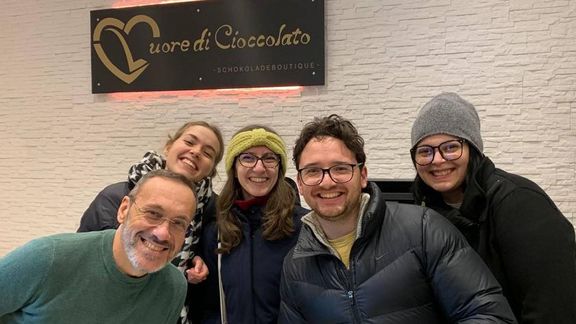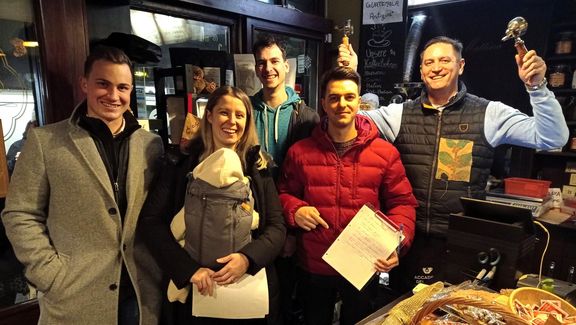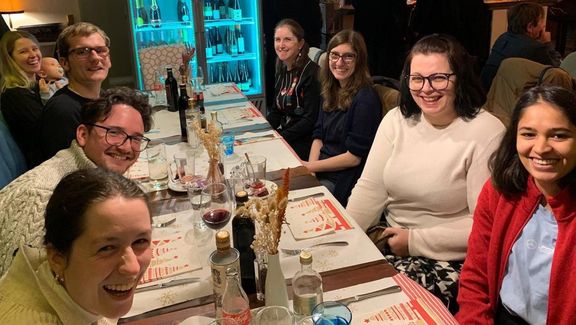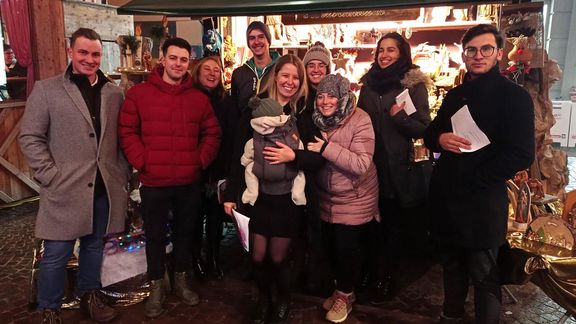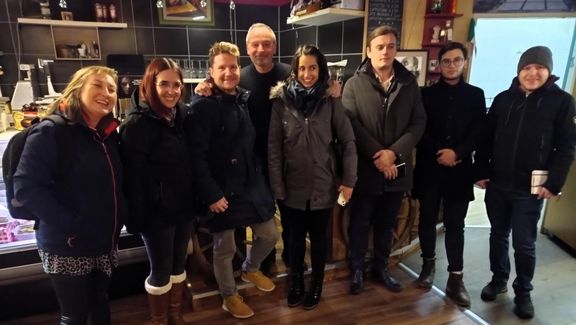Why should someone learn Italian while studying and working at CUAS?
Out of about 65.000 people living in Villach, almost 1000 are Italian expats. They are well integrated in the city life, working for big industries in the area or enriching the city centre with their shops, restaurants, and cafeterias. A big part of the Italians on the other side of the border, in Tarvisio, is fluent in German. Carinthia and Friuli are not only good neighbours: their past and present are intertwined regarding culture, language, economy, and society. Around the world there are over 5 million Italian citizens living abroad, holding key positions in scientific research, technology, arts, and gastronomy. Given all this, the question would rather be: why should someone not learn Italian?
CUAS has an international orientation, which becomes particularly visible thanks to the language courses: both bachelor and master students can join them. Multilingualism is not only a goal: we are already living it. Many students come from abroad and teaching languages is the CUAS way to reach hands, a contribution to build an intercultural network spreading worldwide.
How it all started
A few years ago, Karin Martin, former Senior Lecturer and Researcher and currently guest speaker at CUAS, started to organize a field trip that allows students to do their very first experience of language immersion without leaving town: she established a contact between Italian lecturers and Italian entrepreneurs in Villach, who are willing to interact with students. This kind of field trip is particularly indicated for those study programs that can integrate study and work: it allows students to have an immersive language experience within the usual class time. Normally it would be quite a challenge for working students to take part in a field trip of their foreign language course, but this way they can seize all the opportunities: meeting native speakers, making the first steps speaking about business in a foreign language. Elisa Borella and Stefania Squadrito, the course lecturers from the IBM and IEM master study program, wanted to offer this opportunity to the students who started learning Italian from Winter Semester 2023/24. They organized a field trip in the city centre of Villach to interview Italian entrepreneurs. This project was the first collaboration between Ms. Squadrito and Ms. Borella, who recently joined CUAS as a Senior lecturer, and was fun both to organize and conduct, letting the groups overlap their classes for once and sharing a useful experience: meeting the Italian community and having a first-hand knowledge of the Italian contribution to the city’s business life. Ms. Squadrito and Ms. Borella started to prepare the field trip in class: respectively the IEM class, with students having mostly German as a mother tongue, and the IBM class, with international students from Austria, Russia, Romania, India, Slovenia, and the Philippines. The work in class included letting the students choose the questions for the interview and practising in small groups. The motto was “All questions allowed” and they gathered a wide range of questions, from “What do you do for a living?”, “Which type of customers do you have?” to “Do you like pizza Hawaii?” – a running gag between foreigners and Italians, the latter being very serious about what goes along with pizza and what does not. Warning: do not put pineapple on an Italian pizza!
The Italian immersive experience
Italian expats and entrepreneurs responded to the teachers’ invitation and were ready to be interviewed by the students. The two classes were split in smaller groups, fitter to conduct the interviews a few at a time, while other groups completed different tasks to keep using the language all the time: looking for Italian words in town (shop names, products), practising pronunciation by making videos reading or singing Christmas poems and carols. This resulted in a full language immersion, keeping in contact with the Italian language during the whole field trip and allowing every student to try all the tasks. On one side, they consolidated structures learned in class like talking about habits and work, on the other side they trained their reading and speaking skills, discovering the rhythm of the language.
Michele Zambon of the cafeteria Amore Italiano, Razvan Ban of the coffee roastery and cafeteria La Mattina, Adriano De Carlo from the chocolate manufactory Cuore di Cioccolato, and the woodcarver and artist Mr. Renato Puntel with his daughter Ms. Marlyn Puntel answered questions many times, speaking slowly, helping the students making their very first experience with native speakers and talking about expats’ life. Ms. Borella and Ms. Squadrito would like to send them a big thank you for their friendliness, enthusiasm, and professionalism. This shared field trip had both the results to lead the students to an immersive experience with native speakers and to bring the two study programs together, IEM and IBM.
The project did not end with the interviews and continued first with an Italian dinner and the week afterwards in class: the students elaborated the results of the activities in class speaking about the information they gathered and what they could do to improve their skills. The follow up led to an interesting discussion about the role of Italian expats and the Italian language in the economy and society of Villach. Our students’ conclusions were that Italian is commonly used to sell items related to fashion, food and wine, and that marketing uses it often to make some products more attractive, so that some Italian words has become part of our everyday language in Austria and abroad, like latte macchiato, cappuccino, amore or ciao. A foreign language is therefore a mighty marketing instrument both for the locals and for the incoming tourists. Beyond that, Italian expats are an important part of Villach’s society and economy, playing a big role in the city life, which they fill with shops and restaurants and enrich with their culture.
